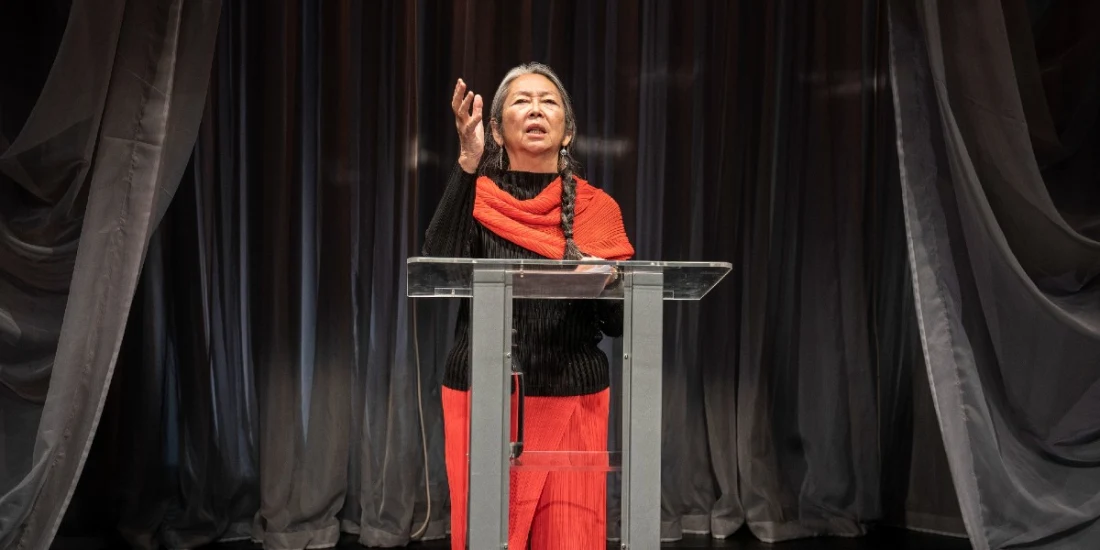'Out of Time' review — five wise monologues remind us that life is fleeting
Memento mori is Latin for "remember that you will die." In Out of Time, a National Asian American Theatre Company (NAATCO) and Public Theater co-production, the transient nature of life is never far from mind. The play features five accomplished Asian American actors, each starring in a monologue by one of five Asian American playwrights.
At two and a half hours long in total, most of these monologues could have benefited from stricter editing, but ― memento mori: each performer is over 60 years old. Though time is the one thing we cannot replace, after listening to each character speak, I felt that their earned wisdom might spare me future pain.
That is the gist of Out of Time. These individual characters all wish to impart lessons as atonement for their failings. With the exception of Sam Chanse's "Disturbance Specialist," they manage to avoid didacticism. Though one can even forgive this faux pas, as she has penned a scorching yet compassionate send-off for once-lauded elders who have tripped into the zeitgeist of cancellation vs. accountability.
In "Disturbance Specialist," Natsuko Ohama plays Leonie, an unrepentant activist and educator who finds herself "canceled" after issuing an unfortunate tweet. She never presents context for what she said. Instead, Chanse illustrates the tragedy of a self-inflicted fall from grace. Ohama is thrilling as she waxes between defensiveness, descriptions of potential offenses, acknowledgment of harm, and finally, acceptance that there is no redemption for her.
Redemption also factors into the evening's two strongest entries ― Anna Ouyang Moench's "My Documentary" and Naomi Iizuka's "Japanese Folk Song" ― both of which could easily expand into evening-long works. In the former, Page Leong portrays an unnamed documentary filmmaker who connects the early death of her twin sister to a later loss in her life. As her character, Leong exudes the crisp remove of an impartial investigator, though her mask slips as she wanders toward the one thing she cannot control: love. The tragedy is that there is no way to redeem love after it is gone.
In "Japanese Folk Song," Glenn Kubota renders Taki with the affable charm of an indulgent grandparent who manages to make griping fun. Taki has no occupation; he simply meanders through reveries. Eventually, he latches onto his loathing for the arbitrary chaos of jazz music. But in recalling his first wife's favorite song ― Thelonious Monk's "Japanese Folk Song," which is based upon the Japanese folk song "Kōjō no Tsuki" ― he begins to hear the undergirding tune. This awakens Taki to his current reality, which was caused by a betrayal, but from which there is no escape.
Watching Kubota and Leong grapple with their personal hells in these beautifully crafted monologues is worth the price of admission on its own.
Mia Chung's "Ball in the Air" and Jaclyn Backhaus's "Black Market Caviar" are less captivating, though I admired their willingness to be weird and challenging. "Ball" features Mia Katigbak unleashing her unerring skill with a paddle ball. The trick, she reveals, is in her concentration. Faltering concentration becomes an analogy for what happens to her character, Ena, after she loses her composure. Though Katigbak is fully committed to the part, "Ball in the Air" feels too on the nose in connecting that point ― concentration vs. losing oneself ― to its conclusion.
Meanwhile, "Black Market Caviar" is framed as a video recorded by Carla as a glimpse into the future scarcity of certain goods. As Carla, Rita Wolf is both daffy and earnest while sharing her greatest fantasies. I did not enjoy the piece but admired its inventiveness, craftsmanship, and juxtaposition between macro issues and the desire for luxury. Backhaus's monologue would have benefitted from interactions between additional characters.
But even when the playwrights' choices were exasperating, I was always grateful to Out of Time for reminding me that life is fleeting ―and not just my own. After returning home from the show, I immediately called a few of the elders in my life and begged them to prattle on about whatever. What once might have felt indulgent and mercurial was now replete with indispensable wisdom. I was able to hear it after sitting with Out of Time because I was finally listening to appreciate them, rather than simply humor them.
Photo credit: Natsuko Ohama as Leonie in "Disturbance Specialist" as part of Out of Time. (Photo by Joan Marcus)
Originally published on
